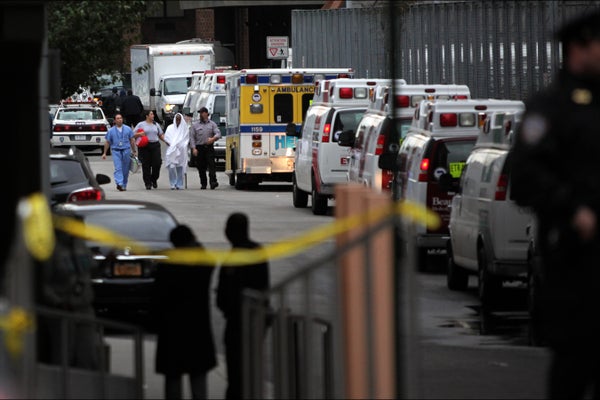Extreme Weather Events Raise Death Rates for Weeks
Extreme Weather Events Raise Death Rates for Weeks
Emergency room visits and deaths can be heightened for weeks after a major extreme weather event, according to a new study
Evacuation from Bellevue Hospital October 31, 2012 in New York City. The hospital had been operating on backup generators since losing power during Hurricane Sandy but had to be evacuated once the extent of the damage became clear.
Allison Joyce/Getty Images
CLIMATEWIRE | Emergency room visits and deaths can be heightened for weeks after a major extreme weather event, according to a new study from researchers at two Massachusetts hospitals that highlights gaps in federal tracking for billion-dollar disasters.
The study, published Thursday in Nature Medicine, looked at weather events between 2011 and 2016 that caused more than $1 billion in damages and compared them with data from Medicare. They found that one week after major weather events, emergency department visits and mortality remained elevated by more than 1 percent from pre-disaster levels, and deaths remained elevated for as much as six weeks after the event.
“These findings suggest that the biggest weather disasters have broad and long-lasting impacts on health emergencies and deaths among those who have Medicare,” said lead author Renee Salas, an emergency room physician at Massachusetts General Hospital.
On supporting science journalism
If you’re enjoying this article, consider supporting our award-winning journalism by subscribing. By purchasing a subscription you are helping to ensure the future of impactful stories about the discoveries and ideas shaping our world today.
Salas and her co-authors see their study as a jumping-off point for further research — particularly to help fill gaps in the ways the federal government quantifies the toll of disaster.
The authors collected information about billion-dollar disasters from NOAA’s National Centers for Environmental Information. It reports the number of immediate deaths associated with each disaster, but the researchers say their study could act as “proof of concept” for how to extend mortality reporting to include longer-term data following a disaster.
Tracking the impact that disasters have on emergency room visits, hospitalizations and deaths also can help “lay the ground work” for additional studies to quantify the health care costs of disasters — something not included in the billion-dollar price tag tracked by the federal government.
“Given the speed and scale with which these disasters have been occurring, we need to understand the problem, and I hope there will be many more researchers who look into this,” Salas said. “With billion-dollar disasters happening with increased frequency, having an updated analysis of these events is important.”
Reprinted from E&E News with permission from POLITICO, LLC. Copyright 2024. E&E News provides essential news for energy and environment professionals.
Extreme Weather Events Raise Death Rates for Weeks
Emergency room visits and deaths can be heightened for weeks after a major extreme weather event, according to a new study

Evacuation from Bellevue Hospital October 31, 2012 in New York City. The hospital had been operating on backup generators since losing power during Hurricane Sandy but had to be evacuated once the extent of the damage became clear.
Allison Joyce/Getty Images
CLIMATEWIRE | Emergency room visits and deaths can be heightened for weeks after a major extreme weather event, according to a new study from researchers at two Massachusetts hospitals that highlights gaps in federal tracking for billion-dollar disasters.
The study, published Thursday in Nature Medicine, looked at weather events between 2011 and 2016 that caused more than $1 billion in damages and compared them with data from Medicare. They found that one week after major weather events, emergency department visits and mortality remained elevated by more than 1 percent from pre-disaster levels, and deaths remained elevated for as much as six weeks after the event.
“These findings suggest that the biggest weather disasters have broad and long-lasting impacts on health emergencies and deaths among those who have Medicare,” said lead author Renee Salas, an emergency room physician at Massachusetts General Hospital.
On supporting science journalism
If you’re enjoying this article, consider supporting our award-winning journalism by subscribing. By purchasing a subscription you are helping to ensure the future of impactful stories about the discoveries and ideas shaping our world today.
Salas and her co-authors see their study as a jumping-off point for further research — particularly to help fill gaps in the ways the federal government quantifies the toll of disaster.
The authors collected information about billion-dollar disasters from NOAA’s National Centers for Environmental Information. It reports the number of immediate deaths associated with each disaster, but the researchers say their study could act as “proof of concept” for how to extend mortality reporting to include longer-term data following a disaster.
Tracking the impact that disasters have on emergency room visits, hospitalizations and deaths also can help “lay the ground work” for additional studies to quantify the health care costs of disasters — something not included in the billion-dollar price tag tracked by the federal government.
“Given the speed and scale with which these disasters have been occurring, we need to understand the problem, and I hope there will be many more researchers who look into this,” Salas said. “With billion-dollar disasters happening with increased frequency, having an updated analysis of these events is important.”
Reprinted from E&E News with permission from POLITICO, LLC. Copyright 2024. E&E News provides essential news for energy and environment professionals.
